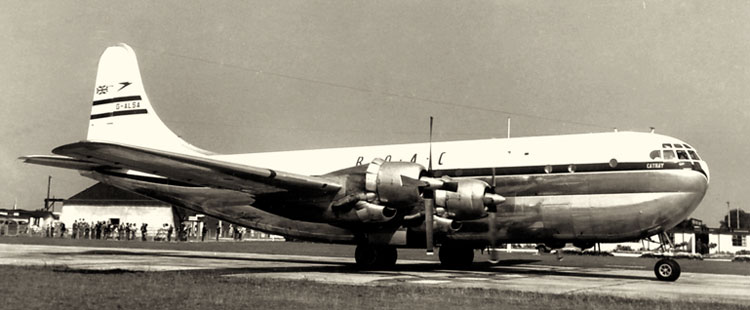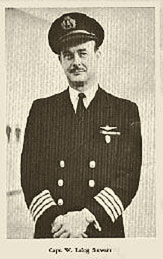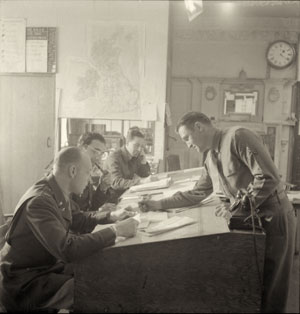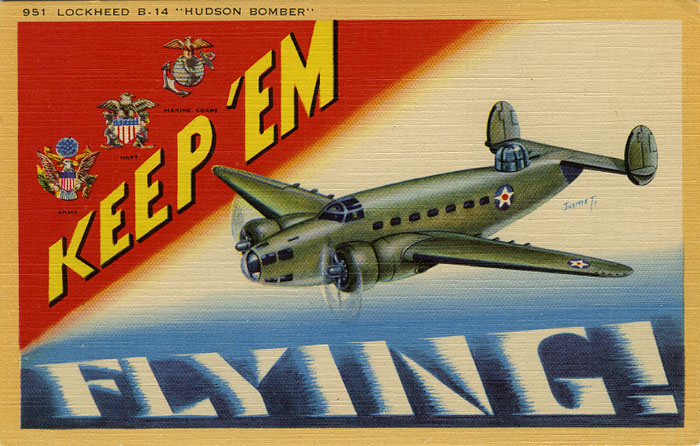Christmas tragedy at Prestwick (Part 2)
Airliners rarely fall out of the sky on their own accord, or because one thing goes wrong. The crash of an airliner is usually the final event in a what crash investigators call a “cascade” of related events, one leading to another and then another until the unthinkable becomes inevitable. So it was early on that Christmas morning in 1954 when BOAC Stratocruiser G-ALSA fell from the sky.

The Stratocruiser was not a particularly safe airplane. However, while some Stratocruiser crashes resulted from mechanical failures, the crash at Prestwick apparently involved only human fallibility, and not necessarily “pilot error,” despite crash investigation findings. The Aviation Safety Network provides the following report, compiled from a number of sources:
The Stratocruiser was high on the approach to Prestwick. The aircraft entered a steep descent, but flare out came too late. Following a heavy landing, the plane ran onto the runway, became airborne and crashed.
PROBABLE CAUSE: Errors of judgement on the part of the captain in a) starting his final approach to land at too steep an angle and b) flaring out too late and too severely with the result that the aircraft sank and hit the ground short of the runway. During the flare-out the aircraft passed through low cloud, thus reducing the captain’s visibility. The accident was also contributed to by the failure of the first officer to carry out the order of the captain to put on the landing lights which prevented the captain from observing timeously the low cloud over the approach lights.
Harsh words, which seem to boil down to “pilot error”. But it turns out not to have been that simple. It’s hardly ever that simple.
The pilot’s son responds
Malcolm Stewart, a film and television actor living in of Vancouver, is the son of Captain William L. Stewart, the pilot in command of Stratocruiser G-ALSA on that tragic Christmas morning. When Malcolm saw an earlier version of this web page, he contacted me by e-mail to provide additional information about the crash.
The survivors of any such tragedy, as lucky as they are, can face difficult challenges for the rest of their lives, and become in every sense victims. That was so in the case of Capt. Stewart, who lived out his life under the dark shadow of the disaster. Here is Malcolm’s e-mail:
Dear Mr. Ingraham,
How strange it was to come across your information on this crash. You see, my father, Capt. William L. Stewart, who died in 1980, was the pilot of that aircraft. I was only five years of age at the time but remember it as if it were yesterday. It was the only time I had ever seen both of my parents cry. My father was devastated by this event and was never the same afterwards.

It might interest you to know what led up to the accident. My father had been on call on Christmas Eve at Heathrow [in London] for more than 12 hours before taking off for Prestwick shortly before midnight. After taking off he discovered there was a landing gear problem and decided to come back in. He also decided to dump fuel because they were not sure if the gear was going to work properly. Fortunately, it did, but the flight was delayed several hours while they fixed the problem.
By this time my father was well over his on-call time (basically overtime). He was asked if he wanted to bring in another crew to fly to Prestwick. My father felt that it would be very unfair to call up another crew so late on Christmas eve and declined the offer.
They finally took off again, exhausted, some time after midnight to Prestwick. You know the rest. There are however a couple of details which may have contributed to the crash.
One is that there were no runway lights on at Prestwick as they were being repaired.
The other and more important point is that although he was quite prepared to accept responsibility as the Captain he went to great lengths to insist that when he asked for aircraft landing lights from the 1st officer he did not get them (perhaps the first officer did not hear him), and when he asked him again he believes the 1st officer mistakenly flipped the flap lever instead causing the aircraft to pitch suddenly upwards and stall out.
Unfortunately, he lost the appeal and was essentially grounded. He retired from BOAC in 1959 and started a small motel in Vermont which is where I grew up.
With all respect to the people who lost their lives or loved ones that evening, my father was never the same. He lived with it every day of his life and it affected all of us. It was the unspeakable event that lay beneath the surface for the rest of his life.
Nowadays, as I am sure you know, airline safety rules are much more stringent, so I hope some good came out of it somewhere. Thank you for this page, it was tough to see but I am glad I did see it.
Sincerely, Malcolm Stewart
Here’s some additional information about the aborted flight and the final flight between London and Prestwick:
The aborted flight
The original flight plan called for a stop at Manchester in northern England, but due to the bad weather it was rerouted directly to Prestwick and the flight was delayed while it waited for a Manchester passenger to be brought to London. It left London at 21:43 GMT (9:43 p.m.), but had to return because of the mechanical problem, landing at 22:53 (10:53 p.m.).
The problem with the landing gear required the aircraft to be be grounded for servicing; passengers and crew transfered to Stratocruiser G-ALSA.
The final flight
G-ALSA took of from London for Prestwick at 01:05 GMT (1:05 a.m.) on 25 December, arriving at about 03:30 (3:30 a.m.) in rain with low cloud. By that time, Captain Stewart had been on call for 12 hours, and flying or preparing to fly for an additional 5 hours and 57 minutes.
Inquiry
The public inquiry into the crash of G-ALSA opened at Ayr in South West Scotland, near Prestwick, on March 28, 1955. The inquiry announced its findings on July 20. It found that the accident was caused by an error of judgement by the pilot and was contributed to by the first officer not turning on the landing lights. It concluded that the accident was not caused or contributed to by any wrongful act or party and/or mechanical defect in the plane.
The inquiry recommended that while there was nothing in the aircrew’s tour of duty to cause undue fatigue, BOAC should consider limiting the hours of duty of an aircrew at an airport.
Capt. Stewart, as his son Malcolm noted in his email, appealed the decision, but lost.
No average pilot

In the world of aviation, even in the absence of any dereliction of duty, a serious accident can cost aircrew their careers despite a long record of competence. And Captain Stewart wasn’t merely competent: he was among the first pilots pioneering what would become in post-war years regular land-plane flights across the North Atlantic Ocean.
Capt. Stewart is mentioned in two books about Royal Air Force Ferry Command, Atlantic Bridge and Ocean Bridge. Ferry Command was the British initiative that grew out of the need to transport military equipment, aircraft, and personnel between North America and the United Kingdom.

Capt. Stewart took part in the second Hudson formation delivery across the Atlantic in November 1940, a time when air crews had to trust to blind luck and good weather in crossing the North Atlantic with badly needed war matérial, and often had a shortage of both good luck and good weather.
Merchant Airmen — The Air Ministry Account of British Civil Aviation 1939-1944 mentions that Captain Stewart was the first British pilot to complete 100 Atlantic crossings, in December 1944. It also recounts a flight he made from Prestwick to Toronto with spare parts urgently needed by the De Havilland factory, which was producing the Mosquito medium bomber.
Next, in Part 3: Malcolm Stewart was not the only reader whose interest in the Prestwick crash is more than casual. Learn how the Christmas crash of G-ALSA affected so many other lives, including that of Lesley Tutty, who was only seven years old when her much older sister, Irene, and her new husband perished in the crash.